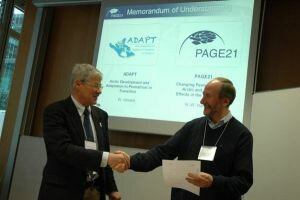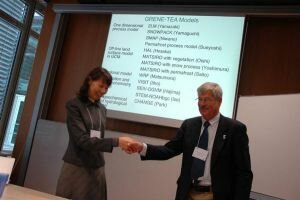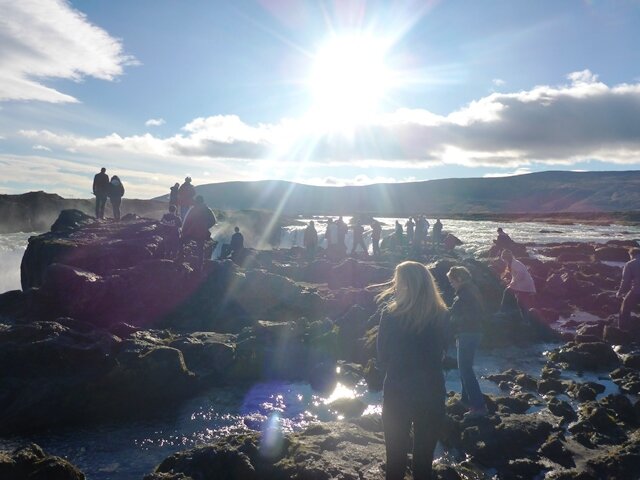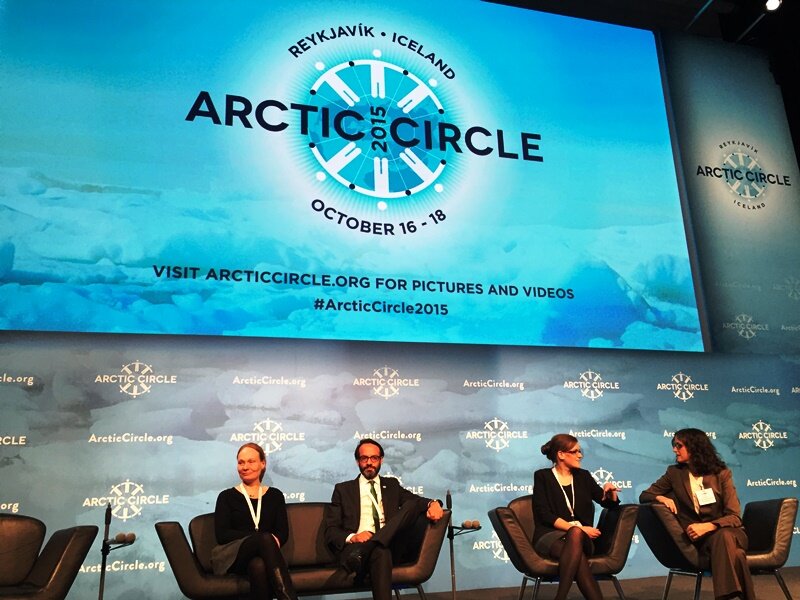PAGE21 signs Memorandum of Understanding with the Canadian ADAPT and Japanese GRENE TEA projects
- Details
- Created on Monday, 19 November 2012 15:29
 Prof. Dr. Hans-Wolfgang Hubberten, Coordinator of PAGE21 and Dr. Warwick F. Vincent the Leader of the ADAPT project after signing the Memorandum of Understanding. Photo: Melanie Dahms, Alfred Wegener InsitituteThe PAGE21 Consortium was honoured with two external visits in this years General Assembly. Professor Dr. Warwick Vincent from University of Laval in Canada and leader of the Arctic Development and Adaptation to Permafrost in Transition - ADAPT project, and Dr. Atsuko Sugimoto from University of Hokkaido in Japan and Principal Investigator of the GRENE Arctic Climate Change Research project: Change in the terrestrial ecosystems of the pan-Arctic and effects on climate presented their research projects to 67 PAGE21 consortium members convened at the Max Planck Institute for Meteorology (MPI-M) campus in Hamburg last week.
Prof. Dr. Hans-Wolfgang Hubberten, Coordinator of PAGE21 and Dr. Warwick F. Vincent the Leader of the ADAPT project after signing the Memorandum of Understanding. Photo: Melanie Dahms, Alfred Wegener InsitituteThe PAGE21 Consortium was honoured with two external visits in this years General Assembly. Professor Dr. Warwick Vincent from University of Laval in Canada and leader of the Arctic Development and Adaptation to Permafrost in Transition - ADAPT project, and Dr. Atsuko Sugimoto from University of Hokkaido in Japan and Principal Investigator of the GRENE Arctic Climate Change Research project: Change in the terrestrial ecosystems of the pan-Arctic and effects on climate presented their research projects to 67 PAGE21 consortium members convened at the Max Planck Institute for Meteorology (MPI-M) campus in Hamburg last week.
The Arctic Development and Adaptation to Permafrost in Transition - ADAPT project aims to produce an 'Integrated Permafrost Systems Science' framework that will be used to help generate sustainable development and adaptation strategies for the North in the context of rapid socio-economic and climate change. It will generate a new Canadian vision of permafrost, by advancing fundamental new insights into permafrost as a coupled physical-biotic-human system as well as new conceptual understanding and quantitative models of permafrost as a biogeochemically reactive part of the planetary system. In addition it will create new mechanistic models of permafrost geophysical dynamics that can be used to improve Northern development and adaptation strategies.
 Dr. Atsuko Sugimoto and Prof. Dr. Hans-Wolfgang Hubberten shaking hands after signing the MoU, Photo: Melanie Dahms, Alfred Wegener Institute.The GRENE-TEA Change in the terrestrial ecosystems of the pan-Arctic and effects on climate project aims to clarify the role and function of the Arctic terrestrial system in the climate system and assess the influence of changes in the Arctic on a global scale. The project will conduct field observations on frozen soil, vegetation, production of ecosystems, carbon storage, snow cover and albedo as well as methane emission along with other measurements to develop terrestrial system models that can reproduce realistic changes in the thawing of frozen soil, vegetation, and greenhouse gas emissions
Dr. Atsuko Sugimoto and Prof. Dr. Hans-Wolfgang Hubberten shaking hands after signing the MoU, Photo: Melanie Dahms, Alfred Wegener Institute.The GRENE-TEA Change in the terrestrial ecosystems of the pan-Arctic and effects on climate project aims to clarify the role and function of the Arctic terrestrial system in the climate system and assess the influence of changes in the Arctic on a global scale. The project will conduct field observations on frozen soil, vegetation, production of ecosystems, carbon storage, snow cover and albedo as well as methane emission along with other measurements to develop terrestrial system models that can reproduce realistic changes in the thawing of frozen soil, vegetation, and greenhouse gas emissions
Following the presentations, Memorandums of Understanding were signed between the PAGE21 project and the Japanese and Canadian project respectifully to enhance synergies within climate change and especially permafrost research.





